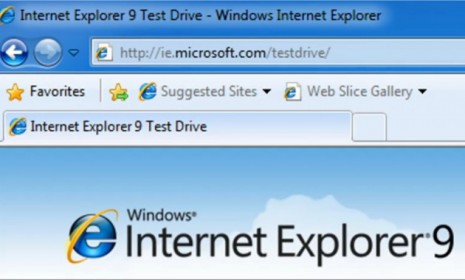Will Microsoft's next web browser make surfing safer?
A new feature in Internet Explorer 9 will let users prevent websites from tracking their online activity. But is this really about privacy?

A free daily email with the biggest news stories of the day – and the best features from TheWeek.com
You are now subscribed
Your newsletter sign-up was successful
In its upcoming version of Internet Explorer, Microsoft will introduce a "Tracking Protection" feature allowing users to block certain websites from collecting information about them. They will also be able to subscribe to "Tracking Protection Lists," directories of untrustworthy sites to be blocked. (Both features are "opt-in," meaning they will need to be activated by users.) Microsoft's announcement comes a week after the Federal Trade Commission said the online-ad industry is not transparent enough about what data it collects from users. Are IE9's new features an important step in online privacy control — or just good business strategy?
It probably will not have much effect: "Most users are unlikely to start creating these lists on their own," says Kashmir Hill at Forbes. "Only the nerdiest of Web surfers actually plays with their browser settings," and "most are simply unaware of which third parties are gathering data about them." This just invites "consumer groups to create lists of acceptable and unacceptable sites," but it's doubtful that many people will subscribe to them.
"Microsoft will add a 'Do Not Track' tool to Internet Explorer, but it's complicated"
The Week
Escape your echo chamber. Get the facts behind the news, plus analysis from multiple perspectives.

Sign up for The Week's Free Newsletters
From our morning news briefing to a weekly Good News Newsletter, get the best of The Week delivered directly to your inbox.
From our morning news briefing to a weekly Good News Newsletter, get the best of The Week delivered directly to your inbox.
This is about advertising, not privacy: "Regardless of the spin" about privacy, says Kip Kniskern at Liveside, this service is "largely an ad blocker." Advertisers will be able to offer their own Tracking Protection Lists that will make sure their ads get seen, but for Web surfers who want to avoid commercial messages, this new feature will "effectively shut off ads" from major ad companies "across any number of websites."
"IE9 tracking protection: A built in IE9 ad blocker?"
It is a winning strategy for Microsoft: Mozilla removed a similar tool from a test version of its Firefox browser, says Jason Mick at Daily Tech, "caving" to advertisers who say it will hurt business. Mozilla depends on ads; Microsoft doesn't, so it can afford to cross advertisers. This is "a clever business tactic" — Microsoft could "win back" customers who abandoned IE for Firefox by becoming the new "champion of privacy."
"Mozilla kills 'Do Not Track' tool, Microsoft adds one to IE9"
A free daily email with the biggest news stories of the day – and the best features from TheWeek.com
-
 5 blacked out cartoons about the Epstein file redactions
5 blacked out cartoons about the Epstein file redactionsCartoons Artists take on hidden identities, a censored presidential seal, and more
-
 How Democrats are turning DOJ lemons into partisan lemonade
How Democrats are turning DOJ lemons into partisan lemonadeTODAY’S BIG QUESTION As the Trump administration continues to try — and fail — at indicting its political enemies, Democratic lawmakers have begun seizing the moment for themselves
-
 ICE’s new targets post-Minnesota retreat
ICE’s new targets post-Minnesota retreatIn the Spotlight Several cities are reportedly on ICE’s list for immigration crackdowns